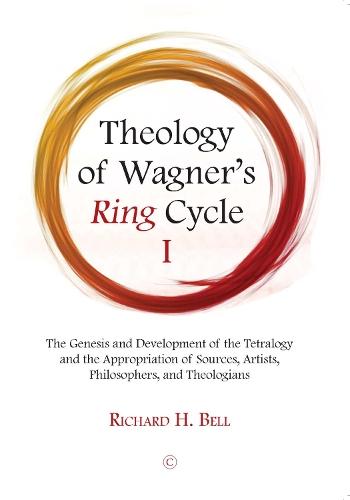Overview
Wagner's Ring is one of the greatest of all artworks of Western civilization, but what is it all about? The power and mystery of Wagner's creation was such that even he felt he stood before his work 'as though before some puzzle'. A clue to the Ring's greatness lies in its multiple avenues of self-disclosure and the corresponding plethora of interpretations that over the years has granted ample scope for directors, and will no doubt do so well into the distant future. One possible interpretation, which Richard Bell argues should be taken seriously, is the Ring as Christian theology. In this first of two volumes, Bell considers, among other things, how the composer's Christian interests may be detected in the 'forging' of his Ring, in his appropriation of sources (whether they be myths and sagas, writers, poets, or philosophers), and in works composed around the same time, especially his Jesus of Nazareth.
Full Product Details
Author: Richard H. Bell, Jr.
Publisher: James Clarke & Co Ltd
Imprint: James Clarke & Co Ltd
ISBN: 9780227177471
ISBN 10: 0227177479
Pages: 342
Publication Date: 27 July 2021
Audience:
General/trade
,
General
Format: Paperback
Publisher's Status: Active
Availability: Available To Order

We have confirmation that this item is in stock with the supplier. It will be ordered in for you and dispatched immediately.
Reviews
Add this to your list of essential reading! Comprehensive and authoritative, Bell's Theology of Wagner's Ring Cycle I maps the theological territories of Wagner's wide-ranging literary, poetic, philosophical, and musical influences. Never before has The Ring been subject to such a sustained theological argument and approach . . . a conceptually transformative book bound to recalibrate our understanding of Wagner and his intellectual world. Bennett Zon, Director, Centre for Nineteenth-Century Studies, Durham University; General Editor, Nineteenth-Century Music Review Applying a theological lens to familiar ground, Richard Bell argues in these volumes that Wagner's Ring cycle can be seen as a Christian allegory. Through a rich account of the composer's intellectual world, the author unpacks such classic theological concerns as nature and the fall; love, death, and immortality; freedom, necessity, and providence; and redemption-to the great benefit of both Wagnerians and theologians. Stephen McClatchie, Professor of Theology & the Arts, Huron University College, London, Ontario I am not aware of any more meticulous trawl of the voluminous sources for, and influences on, the Ring, through the ancient Greek dramas, Old Norse and Germanic myths, Dante and Shakespeare to Goethe and Schiller. The work of the major German Idealists-Fichte, Kant, Schelling, Hegel, Feuerbach, and Schopenhauer-is subjected to forensic analysis for Wagner's debt to each. Above all, Professor Bell is concerned to demonstrate possible influences on theological and ethical issues in the Ring. Barry Millington, Editor, The Wagner Journal; Chief Music Critic, London Evening Standard In this erudite and formidably researched study, Richard Bell situates Wagner's Ring cycle within the context of some of the most powerful and influential systems of thought to have shaped the Western mind. Of interest to theologians, philosophers, and historians alike, Bell's challenging ideas will not only inform current and future debates around Wagner, but stimulate and provoke in equal measure. Roger Allen, Emeritus Fellow in Music, University of Oxford
I am not aware of any more meticulous trawl of the voluminous sources for, and influences on, the Ring, through the ancient Greek dramas, Old Norse and Germanic myths, Dante and Shakespeare to Goethe and Schiller. The work of the major German Idealists - Fichte, Kant, Schelling, Hegel, Feuerbach, and Schopenhauer - is subjected to forensic analysis for Wagner's debt to each. Above all, Professor Bell is concerned to demonstrate possible influences on theological and ethical issues in the Ring. Barry Millington, Editor, The Wagner Journal; Chief Music Critic, London Evening Standard In this erudite and formidably researched study, Richard Bell situates Wagner's Ring cycle within the context of some of the most powerful and influential systems of thought to have shaped the Western mind. Of interest to theologians, philosophers, and historians alike, Bell's challenging ideas will not only inform current and future debates around Wagner, but stimulate and provoke in equal measure. Roger Allen, Emeritus Fellow in Music, University of Oxford Add this to your list of essential reading! Comprehensive and authoritative, Bell's Theology of Wagner's Ring Cycle I maps the theological territories of Wagner's wide-ranging literary, poetic, philosophical, and musical influences. Never before has the Ring been subject to such a sustained theological argument and approach. . . a conceptually transformative book bound to recalibrate our understanding of Wagner and his intellectual world. Bennet Zon, Director, Centre for Nineteenth-Century Studies, Durham University; General Editor, Nineteenth-Century Music Review Applying a theological lens to familiar ground, Richard Bell argues in these volumes that Wagner's Ring cycle can be seen as a Christian allegory. Through a rich account of the composer's intellectual world, the author unpacks such classic theological concerns as nature and the fall; love, death, and immortality; freedom, necessity, and providence; and redemption - to the great benefit of both Wagnerians and theologians. Stephen McClatchie, Professor of Theology & the Arts, Huron University College, London, Ontario
Author Information
Richard H. Bell is Professor of Theology at the University of Nottingham, UK. He studied theoretical physics at University College London and theology at Oxford and Tübingen. He is author of Provoked to Jealousy (1994), No one seeks for God (1998), The Irrevocable Call of God (2005), Deliver Us from Evil (2007), and Wagner's Parsifal (2013).




